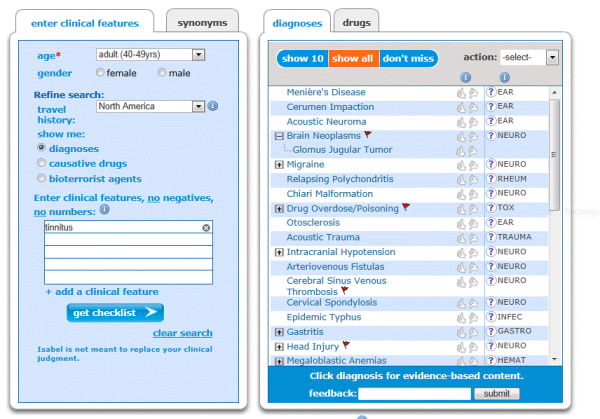- Privacy Policy
- Terms & Conditions
- Contact us
- ©Isabel Healthcare 2025
1 Minute Read: Tinnitus Differential Diagnosis
The Isabel Healthcare 1 Minute Read program highlights various diseases and conditions, providing the Isabel tool differential list. Subscribe to the Isabel blog to receive clinical content and articles.
Tinnitus (also known as tinnitis) is a perception of sounds in the absence of an external acoustic stimulus. It is a symptom rather than a diagnosis and maybe unilateral or bilateral. It is perceived as the auditory equivalent of phantom limb pain. Tinnitus can result due to hearing loss, sounds produced by other ear structures or due to a disease process.
The noise produced by tinnitus is commonly described as a constant buzzing, ringing, cricket-like, hissing, whistling or humming. People age 40-70 years commonly experience tinnitus, but it can occur at any age. Pathologic tinnitus frequently occurs and episodes last longer than 15 minutes. Pulsatile tinnitus is due to rhythmic pulsations being synchronous with the cardiac cycle. Syndromic tinnitus describes tinnitus coexisting with a disease process such as Meniere’s disease or acoustic neuroma.
Common symptoms of tinnitus include:
- presence of risk factors like older age, hearing loss, loud noise exposure
- certain medications like aspirin, NSAIDs, aminoglycosides, furosemide, chloroquine or quinine can cause tinnitus
- episodic ringing noise which can be high pitched or low pitched, aural fullness, fluctuating hearing loss
- hearing loss either bilateral or unilateral
- vertigo
The first test to order is audiometry to look for sensorineural or conductive hearing loss. A differential diagnosis of possible causes of the tinnitus should be worked up and other tests ordered as appropriate to the diagnoses being considered.
- Full blood count to look for anemia
- Thyroid function tests to determine hyperthyroidism or hypothyroidism
- Lipid profile for elevated cholesterol
- Fasting glucose for diabetes
Isabel differential diagnosis for tinnitus
Meniere’s disease presents with a quadrad of symptoms including tinnitus, episodic vertigo, unilateral aural fullness and hearing loss. This normally presents in only one ear, but in a minority of cases it can occur bilaterally. Diagnosis is made clinically and audiometry reveals unilateral sensorineural hearing loss.
Acoustic neuroma (schwannoma) is a benign tumor which arises from the vestibular nerve. As the tumor grows it causes unilateral hearing loss, tinnitus, dizziness and it can cause facial numbness if the trigeminal nerve is involved. If the tumor is large it can compress the fourth ventricle and cause hydrocephalus.
Glomus jugular tumor can cause pulsatile tinnitus in 60% of patients.
Other causes of tinnitus include cerumen (ear wax) impaction, otitis media, ear or hearing trauma and head injuries.
Treatment: Once the cause of the tinnitus has been determined if it is possible to treat the underlying cause, then it should be treated. If no cause can be determined then education, counselling, relaxation techniques and acoustic therapy to mask the noise should be offered. Tinnitus can be very frustrating for the person enduring it and as it’s very prominent when trying to sleep and can therefore lead to disrupted sleep patterns and agitation. A lot of the time reassurance of ruling out more serious disorders can relieve the patient’s anxiety and help them lessen their focus on the tinnitus. Other disorders which may result from the tinnitus like insomnia and depression should be treated separately.
~Mandy Tomlinson, Isabel Quality Assurance Director

Mandy Tomlinson
Mandy has worked for Isabel Healthcare since 2000. Prior to this, she was a Senior Staff Nurse on the Pediatric Infectious disease ward and high dependency unit at one of London's top hospitals, St Mary’s in Paddington which is part of Imperial College Healthcare NHS Trust. Her experience in the healthcare industry for the past 33 years in both the UK and USA means she's a vital resource for our organization. Mandy currently lives and works in Scottsdale, Arizona.
Subscribe Here!
Recent Posts
Isabel DDx Companion with ChatGPT Integration - to help you diagnose even faster
At Isabel Healthcare, we’ve always been driven by one goal: to make clinical reasoning faster,..Virtual Triage: Do more questions lead to better patient outcomes?
One of the common misconceptions related to virtual triage / symptom checker tools is that the more..List Of Categories
- Differential Diagnosis Decision Support
- Differential diagnosis
- Symptom Checker
- Symptoms
- Medical Error
- Patient Disease Information
- Disease
- Clinical Decision Support
- Diagnostic Decision Support
- Isabel 1 Minute Read
- Diagnosis Error
- Diagnosis Skills Cases
- Healthcare Informatics
- Clinical Reasoning
- Evidence-based Medicine
- Medical Education
- Patient Engagement
- Symptom Triage
- Nurse Practitioner Education
- Nursing Decision Support
- Partnership
- Public Health
- COVID-19
- EHR
- Patient Empowerment
- Patient Safety
- rare disease

Start your FREE Trial today
Try the Isabel Pro DDx generator for 30-days - no payment card details required.






